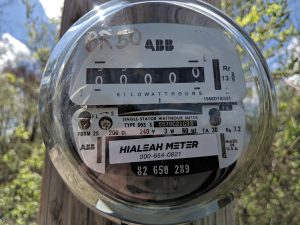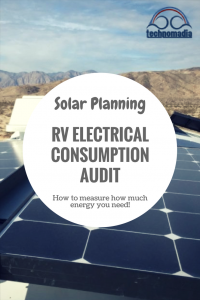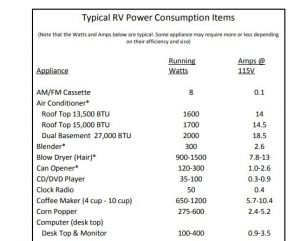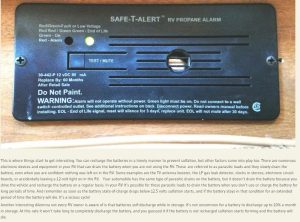After a lot of electrical supply issues last year, we have decided to install electric meters on all seasonal sites. This has caused a great deal of distress and confusion for many seasonal campers.

We realize that it is new and different from the way we had charged a flat rate for electricity in the past. It may take a while for us to get all the dents banged out of the new plan. We are also confident that, at the end of the season, you will find that you are paying only for the electricity you actually use. We used to have to calculate how much electricity all of the campers used in a season and then average it out according to the amps on the site.
Using Meters Makes it Fairer for All Levels of Power Useage
Obviously, some people are only here on the weekends, or for only a week once a month, while others stay for the entire season. Some people like to use electric heaters at the beginning and end of the season, and some people run their air conditioners all summer long. Some people are very frugal in their use of electricity while others don’t concern themselves with shutting off unnecessary electrical units because it doesn’t cost them any extra (for instance, running the air conditioner non-stop while they are not at camp for the whole week). So, the flat rate is not fair to those who are conservative with their electrical usage.
We also realize that many campers buy a trailer to put on a site for the season and use it as a summer home. Because they are always plugged into “shore power” they don’t have much understanding of how their camper’s power consumption works.
We have had complaints that the meter is still spinning even though the camper believes that all things have been turned off in the RV. Even though you have shut off all things you believe draw power, there are still many drains on the system.
There are two systems in a camper.
One is the battery or DC system. Things like your lights and onboard gas leak detectors, will always run on DC. To provide that power, you have a converter which is basically a battery charger. It “converts” the AC current into DC current to keep your batteries topped off and can also provide DC power for your DC equipment.
You also have an AC system which runs things like your microwave, refrigerator and hot water heater.
You most likely can run your refrigerator on “automatic” which means if AC electric is available it will use that rather than propane. Or you can switch the refrigerator to run only on propane. Sounds great, right? If you put the refrigerator on gas only, then it shouldn’t make the meter turn. Well, not really… The refrigerator still needs the DC current to run the panel that determines when it needs cooling, and to power the “sparker ignition” to light the propane when called for. So, it will draw power from your battery and thus call for the converter to draw electricity through the meter.
Your hot water heater can also run on either electricity or propane. So, you put the hot water heater on propane only and expect the meter not to turn. Again, it requires some battery to run the controls and the sparker ignition to light the propane. Again, it causes the converter to draw electricity through the meter.
So sure, you can reduce electricity usage by using your propane, but you won’t eliminate it entirely. (And, you will trade electric cost for propane cost.) Just like in your home there are parasitic drains on your electricity.
If you are concerned that your meter still turns after you have shut off all of your electrical appliances, consider the parasitic draw.
- Don’t just turn off the appliances, unplug them.
- Disconnect the battery (usually there is a battery disconnect switch)
- Once you are sure there is no parasitic load, then check the meter.
- Turn on one item at a time – plug in each appliance and turn it on(turn on the tv, run the microwave, turn on your coffeemaker, etc.) and each time watch your meter to see how rapidly your meter is turning. This will give you a sense of what draws a small amount of power and what is really drawing a lot. You won’t be surprised that your microwave soaks it up, but you might not realize how much power it takes to run your electric kettle. Of course, it is entirely your choice what you decide to run and for how long – we just want you to understand what is making your meter run, so you feel you have control over it.
Please contact us at the office if you have questions or need help in understanding your meter.
There is a lot of good information on the internet about determining how much power your camper will use and how to minimize it. Below are some links to excellent information which will help you to understand how to reduce your electric usage. Some of it relates to determining how much generator you would need or how much solar power to provide your electrical needs, but it will help you to understand where your camper uses power.
https://blog.gorving.com/2016/10/not-another-dead-rv-battery/
https://www.technomadia.com/2014/12/solar-planning-conducting-an-rv-electrical-consumption-audit/





Thank you for the clarification. We look forward to the camping season.
Great Idea! Pay for your usage
This, I believe, is the proper way to charge for electricity. YOU pay only for what YOU use. Your bill has nothing to do with other campers power usage.